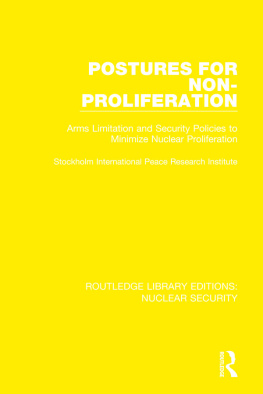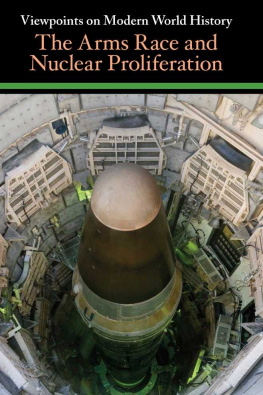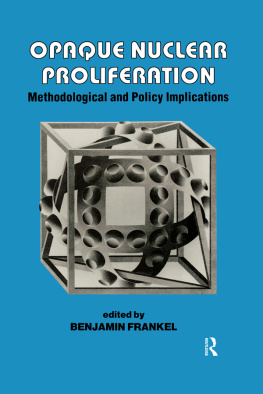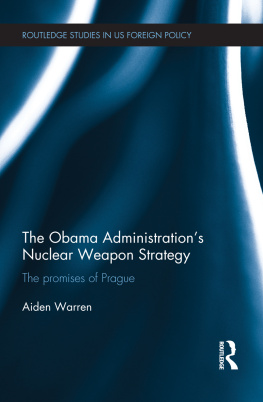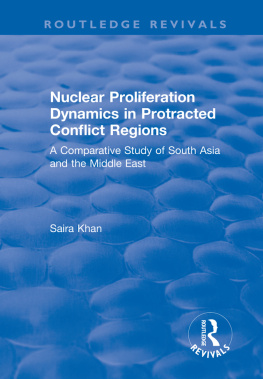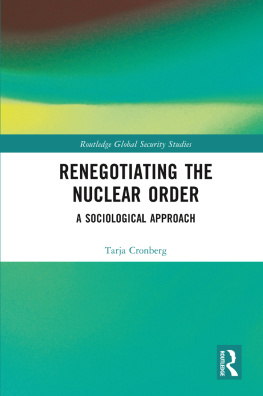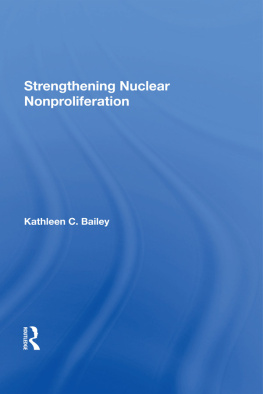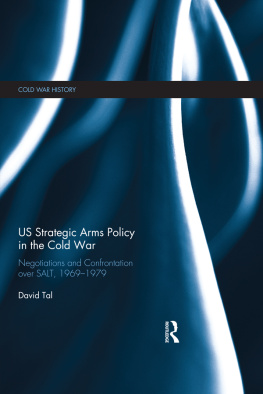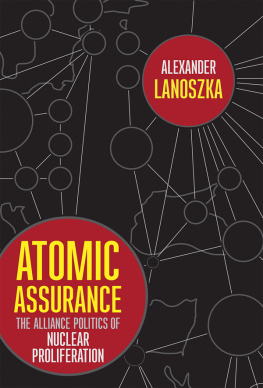First published in 1979 by Taylor & Francis Ltd
This edition first published in 2021
by Routledge
2 Park Square, Milton Park, Abingdon, Oxon OX14 4RN
and by Routledge
52 Vanderbilt Avenue, New York, NY 10017
Routledge is an imprint of the Taylor & Francis Group, an informa business
1979 by Stockholm International Peace Research Institute
All rights reserved. No part of this book may be reprinted or reproduced or utilised in any form or by any electronic, mechanical, or other means, now known or hereafter invented, including photocopying and recording, or in any information storage or retrieval system, without permission in writing from the publishers.
Trademark notice: Product or corporate names may be trademarks or registered trademarks, and are used only for identification and explanation without intent to infringe.
British Library Cataloguing in Publication Data
A catalogue record for this book is available from the British Library
ISBN: 978-0-367-50682-7 (Set)
ISBN: 978-1-00-309763-1 (Set) (ebk)
ISBN: 978-0-367-50960-6 (Volume 3) (hbk)
ISBN: 978-1-00-305199-2 (Volume 3) (ebk)
Publishers Note
The publisher has gone to great lengths to ensure the quality of this reprint but points out that some imperfections in the original copies may be apparent.
Disclaimer
The publisher has made every effort to trace copyright holders and would welcome correspondence from those they have been unable to trace.
Postures for Non-Proliferation
Arms Limitation and Security Policies to Minimize Nuclear Proliferation
sipri
Stockholm International Peace Research Institute
SIPRI is an independent institute for research into problems of peace and conflict, especially those of disarmament and arms regulation. It was established in 1966 to commemorate Swedens 150 years of unbroken peace.
The Institute is financed by the Swedish Parliament. The staff, the Governing Board and the Scientific Council are international. As a consultative body, the Scientific Council is not responsible for the views expressed in the publications of the Institute.
Governing Board
Ms Karin Soder, Chairperson (Sweden)
Professor Robert Neild, Vice-Chairman (United Kingdom)
Mr Tim Greve (Norway)
Academician Ivan Malek (Czechoslovakia)
Professor Leo Mates (Yugoslavia)
Professor Gunnar Myrdal (Sweden)
Professor Bert Roling (Netherlands)
The Director
Director
Dr Frank Barnaby (United Kingdom)
sipri
Stockholm International Peace Research Institute
Sveavagen 166, S-113 46 Stockholm, Sweden
Cable: Peaceresearch, Stockholm
Telephone: 08-15 09 40
First published 1979 by Taylor & Francis Ltd
10-14 Macklin St, London WC2B 5NF
Copyright 1979 by SIPRI
Sveavagen 166, S-113 46 Stockholm
All rights reserved. No part of this publication may be reproduced, stored in a retrieval system or transmitted, in any form or by any means, electronic, mechanical, photocopying, recording or otherwise, without the prior permission of the copyright owner.
Distributed in the United States of America by
Crane, Russak & Company, Inc.
347 Madison Avenue, New York, N.Y. 10017
and in Scandinavia by
Almqvist & Wiksell International
26 Gamla Brogatan
S-101 20 Stockholm, Sweden
British Library Cataloguing in Publication Data
Stockholm International Peace Research Institute
Postures for non-proliferation.
1. Atomic weapons and disarmament
I. Title
327. 174 JX1974.73
ISBN 0-85066-133-1
Typeset by Red Lion Setters, Holborn, London
Printed and bound in the United Kingdom by
Taylor & Francis (Printers) Ltd, Rankine Road,
Basingstoke, Hampshire RG24 OPR
The nature of the relationship between the arms limitation and security policies of the great powers particularly the nuclear weapon states and the acquisition of independent, nuclear weapon capabilities by additional non-nuclear weapon states is an important facet of the general problem of nuclear proliferation. However, it is not a question which has received much careful and systematic attention; rather, it is typically discussed in passing or in terms of particular arms limitation policies of the nuclear weapon states, on the one hand, or the incentives to go nuclear of a particular non-nuclear weapon state, on the other. Yet systematic analysis of this relationship is warranted, since minimizing the proliferation of nuclear weapon capabilities is an important policy objective for world security and since the security policies of the major states help to determine the policy choices of other nations.
Thus, if one is interested in constraining nuclear proliferation, one must, in addition to designing a proliferation-resistant nuclear fuel cycle, identify a set of long-term arms limitation and security policies for the major states which are capable of satisfying various security and political objectives of non-nuclear weapon states, thereby minimizing their incentives to acquire independent nuclear weapon capabilities and collectively minimizing future nuclear proliferation. This book attempts to identify such a comprehensive arms limitation and security regime. It reviews negotiations concerning the NPT up to the end of the Review Conference of the NPT in mid-1975 and the strategic debate concerning nuclear proliferation.
Various books and monographs published by SIPRI over the past five years have addressed related aspects of nuclear non-proliferation. A list of these related SIPRI publications is appended to this text on page 161.
This book was written by Dr Enid C.B. Schoettle, who was a visiting scholar at SIPRI in the summers of 1974 and 1977. She was additionally supported by the Carnegie Endowment for International Peace; the Center for International Studies, Massachusetts Institute of Technology; and the Program for Science and International Affairs, Harvard University. The book was edited by Felicity Roos and Connie Wall. Dr Schoettle is now a Program Officer, Office of European and International Affairs, Ford Foundation.
January 1979
Frank Barnaby
Director
Introduction
In order to design effective policies to minimize the proliferation of nuclear weapons, it is necessary to examine how the arms limitation and security policies of the major states in the international security system particularly the nuclear weapon states affect the decisions which non-nuclear weapon states must make concerning whether or not to acquire an independent nuclear weapon capability. The arms limitation and security policies which might minimize the future proliferation of nuclear weapons to additional states can perhaps best be identified, first, by analysing the debate concerning this relationship in the strategic literature on nuclear proliferation; and second, by analysing the discussions concerning this relationship which have gone on between the nuclear weapon states and the non-nuclear weapon states during negotiations on the Treaty on the Non-Proliferation of Nuclear Weapons (the NPT) of 1968 and at the Review Conference of the NPT held in 1975.

